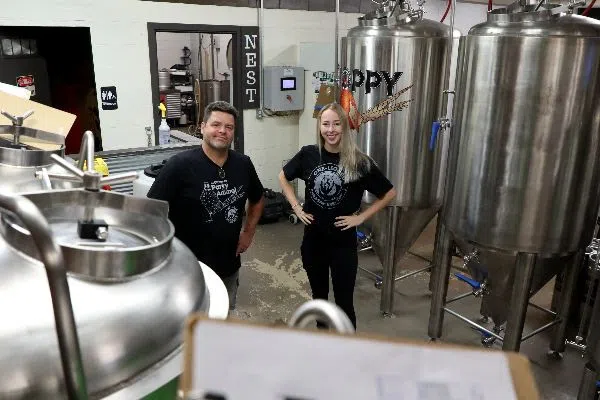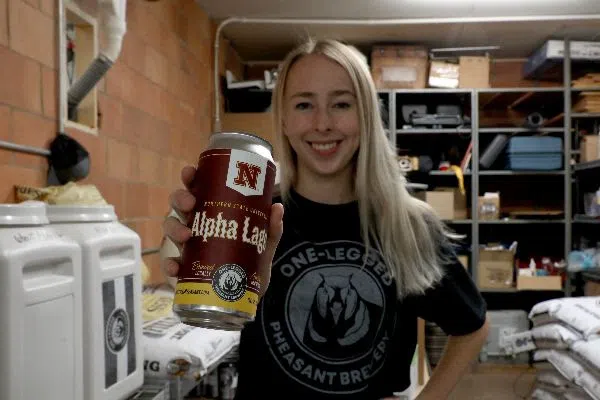Home games are about to get a bit tastier, with matching maroon and gold brews to choose from, thanks to the partnership with One Legged Pheasant.
Alpha Lager, which was released last year, has been a hit. The lager was specifically crafted to be a light, easy-to-drink beer and it has been selling out, even with increased orders. On average, 10 cases are ordered for home games. Each case has 24 16-oz cans. For Homecoming, 16 cases were ordered, said Welling.
“It’s a very drinkable beer,” Welling said. “I didn’t want it to be a boring lager, so I added a few more flavors to give it more character.”
One of the additions is caramel crystals, which give the beer a sweet taste without overpowering the grain flavor.
With the success of Alpha Lager, Dave decided to play around with the idea of an ale, and it was approved. The new ale will be called Waldo Red, in honor of Northern’s previous mascot. It is an Irish red style lager and will have more character, more nuances, Welling said.
“It will be sweeter, maltier up front. And, if everything goes well, it will finish off super clean, almost like tea,” he said.
Waldo Red will be similar to One Legged Pheasant’s Ring Neck Red. But Welling plans to tweak the recipe to make sure it’s unique for Northern. He plans to have it ready for the fall 2025 home games.
“We’re excited for this partnership with One Legged Pheasant and Northern to continue to blossom and grow,” said Zach Flakus, Northern State University Foundation President and CEO. “The Northern Foundation has extremely strong relationships in Aberdeen and the surrounding region.”
The partnership started as an idea between Northern’s College of Arts and Sciences Dean Dr. Alyssa Kiesow and Dave Welling, co-owner of One Legged Pheasant, to create a Northern-specific brew. It was decided that 15% of Alpha Lager sales would go to College of Arts and Sciences scholarships. The partnership also created an internship opportunity for biotechnology and microbiology students.
“This partnership strengthens our relationships with the community even further – as students provide services while gaining real world experience,” said Flakus.
From start to finish, Alpha Lager is a local beer. The interns are hands-on during the whole process. Welling brews Alpha Lager in batches – four barrels at a time – which results in 124 gallons of beer.
“From grain to glass, it takes about 90 days,” Dave said. “Because it’s a lager, it ferments cold.”
All the labels and canning are all done at One Legged Pheasant. Currently, Welling is canning by hand. It takes him about 40 seconds to fill and seam a can. The canning alone can take a couple days when there is a big order to fill, Welling said. He hopes to buy an automatic canner in the future.
Working at the brewery has far reaching applications, even if the students don’t plan to make their own beer.
“Understanding fermentation is a big deal in the food industry and the energy business. This gives students hands-on knowledge of the science, its applications, and procedures,” said Dr. Jon Mitchell, professor of biochemistry and director of NSU’s biotechnology program.
Internships are invaluable. It shows the student has hands-on, real-world experience in their field. In addition, it allows students to branch out beyond classroom applications.
“Internships are so valuable downstream, whether students are going to medical school, or graduate school, or if they want to get a job,” Mitchell said. “Employers want to see that you have experience. Internships and field experiences are something that students can put on their CV, making them stand out and setting Northern apart from many other institutions. All a student has to do is say they are interested and it happens.”
So far, two students have interned at One Legged Pheasant. New alum Kennedy Davis was the first intern. Davis was a biochemistry and German major and is pursuing her doctorate in biochemistry at the University of Maryland, Baltimore County. This year, Jess Splichal is helping at the brewery. Splichal will graduate in December 2024 with a bachelor’s degree in biology, an associate degree in biotechnology plus an Allied Health Certificate. Her plan is to become a physician assistant.
“Fermentation is an incredibly versatile and indispensable tool in biotechnology,” said Splichal. “When many people think of fermentation, typically, they first think of alcohol products such as beer and wine. Yet, fermentation is utilized in producing many other essential products, such as ethanol, biochemicals, and even certain pharmaceuticals like insulin, which inspired me to learn the craft of brewing!”
The interns help with producing all the brewery’s drinks, not just Alpha Lager. Splichal has even helped with new brews that have yet to be named, including a milk stout and a mead. In the process, she’s learned about every aspect of the brewing process, including how to keep a sterile environment, which ties into her medical career.
“There is also a lot of cleaning involved, as contamination is never a good thing. Keeping a sterile environment is very important in brewing,” said Splichal.
Welling sees the internship as an opportunity to teach students a practical application of their classroom education. That includes hands-on in the lab. Welling has the interns conduct cultural studies of the yeast used to make the lagers and sometimes bacteria. Although he has a microscope that he uses, Welling encourages the students to take the sample back to their labs, so they can experiment with it.
“We brought yeast that Welling was interested in back to the lab last year and started genetically engineering it. Now, we have a new strain of yeast which seems to ferment a little differently…exciting stuff!” Mitchell said.
For Splichal, making the mash is her favorite part. It’s one of the most involved processes.
“It’s fun to stir the milled grain as it gets ground, and it makes a lovely, sweet aroma,” Splichal said. “I have mainly been able to help with the early stages of brewing, such as using beer salts to pH balance the water, the type of grains and supplements that are used to flavor the beer, milling the grain, stirring the mash, and even how to take care of a stuck sparge which is what happens when grain becomes too compact at the bottom of the mash and causes difficulties.”
Although students don’t have to be 21 years old to intern at the brewery, they do need to be over the legal age if they want to try it.
Alpha Lager is available at Northern home games, One Legged Pheasant and several Aberdeen stores, including Kessler’s and Walmart. Kegs are available from One Legged Pheasant.
“Beer is fun. It’s a cross between science and art,” Welling said. “And the students get a lot of real-world experience out of it.”
Must be 21 years of age or older to legally consume alcoholic beverages, please drink responsibly.

Photo courtesy of Northern State University.










Comments